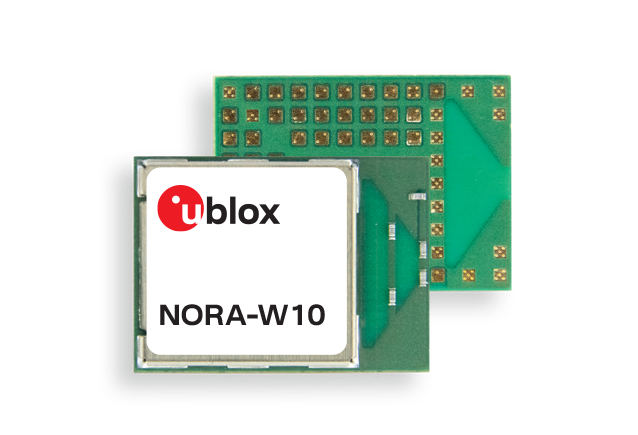Combining Wi-Fi 4 and Bluetooth 5.0 with a powerful open CPU, NORA-W10 offers superior RF performance with low power consumption.
u-blox (SIX:UBXN), a leading global provider of positioning and wireless communication technologies and services, has announced the u-blox NORA-W10 Wi-Fi 4 and Bluetooth low energy 5.0 module. The module targets applications in harsh industrial environments, where reliable RF performance and small size are critical, as well as medical equipment, smart city solutions, and warehouse and retail applications.
NORA-W10 is the successor of the NINA-W10 module, with key feature additions such as Wi-Fi 4 and Bluetooth LE 5.0, improved RF performance, built-in high-capacity flash memory, and low power consumption. The compact module builds on the Espressif ES32-S3 chipset, which hosts a powerful dual-core MCU with artificial intelligence hardware acceleration capable of enabling speech and face recognition applications at the edge. It offers a wide range of hardware interfaces, including USB, CAN, SDIO, and display and camera interfaces.
Concurrent Wi-Fi 4 and Bluetooth 5.0
Offering single-band 2.4 GHz Wi-Fi 4 (802.11b/g/n), NORA-W10 targets lower-end Wi-Fi segments that do not require the higher performance of higher-priced Wi-Fi 5 and Wi-Fi 6 modules. With robust Wi-Fi connectivity in the field and data rates that are sufficient for many industrial applications, Wi-Fi 4 is projected to be the most widely used Wi-Fi technology in IoT applications until at least 2025 and remain on this level for foreseeable future.
Even when communicating over Wi-Fi, NORA-W10 can concurrently transmit data over Bluetooth low energy 5.0, which offers data rates up to 2 Mbps or, using Bluetooth Long Range, can increase signal propagation distances up to four-fold compared to standard Bluetooth LE. Bluetooth mesh support further extends achievable coverage by relaying messages from node to node until they reach their intended destination.
Powerful, secure, globally certified
The module’s dual-core Xtensa LX7 MCU is complemented by 8 MB of flash memory, 512 kb of RAM, and a total of 38 programmable GPIOs. Advanced security features, including accelerated cryptographic flash encryption capabilities and secure boot, allow the globally certified NORA-W10 to securely run sensitive applications in a trusted and isolated environment, without requiring any additional components.
Use cases: From fitness equipment to edge AI
With sufficient flash to support over-the-air updates, the module offers a vast range of integration possibilities. When deployed in connected fitness equipment, for example, the NORA-W10 can concurrently collect data from the equipment and from the user’s smartphone via Bluetooth LE 5.0. This data can then be transmitted over the on-premises Wi-Fi network for central storage.
EV charging stations can leverage the module’s Bluetooth LE 5.0 connectivity to simplify EV box configuration using the user’s smartphone. At the same time, they can transmit charging data to remote service providers via a nearby Wi-Fi access point.
Finally, the module’s AI capabilities make it perfect for edge-hosted face and voice recognition used by digital assistance, as well as by smart home and smart office solutions.
u-blox quality and design
“NORA-W10’s vast feature set makes it a strong contender for demanding applications requiring Wi-Fi 4 and Bluetooth LE 5.0, in a broad range of markets. We are excited to see how product developers leverage the ES32-S3’s dual-core MCU in combination with the high RF performance enabled by our careful module design,” says Magnus Johansson, Product Strategy, Short Range Radio, at u-blox.
Many of the NORA-W10 module’s distinguishing features derive from its u-blox design. The module, which measures 10.4 x 14.3 x 1.8 millimeters comes either with a PCB trace antenna or antenna pins and offers superior RF performance over comparable solutions on the market. And pin/pad compatibility across the u-blox NORA module family allows product developers to address multiple market segments using the same PCB design.
First samples of the NORA-W10 module and EVKs, including the USB variant, will be available in June 2022.















